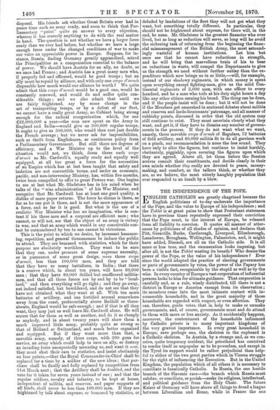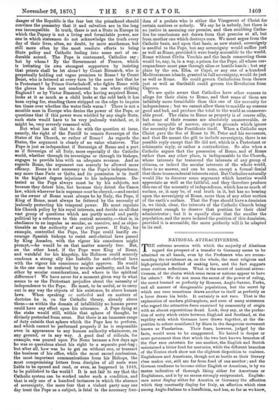THE INDEPENDENCE OF THE POPE.
ENGLISH CATHOLICS are greatly chagrined because the English politicians of to-day underrate the importance of the Pope, and the value to Europe of his independence ; and the Tablet is at great pains to show that Protestant statesmen have in previous times repeatedly expressed their conviction that the Pope must, in the interest of Europe, be released from all liability to coercion. It quotes all manner of utter- anees by politicians of all shades of opinion, and declares that Pitt, Grenville, Burke, Castlereagh, Liverpool, Ellenborough, Lansdowne, Brougham, Wellington, Palmerston, and, it might have added, Disraeli, are all on the Catholic side. It is all more or less true, and the enumeration looks imposing, but after all, is not the Tablet wasting its breath? Who denies the power of the Pope, or the value of his independence? Ever since the world adopted the practice of electing governments or parts of governments by votes, the power of the Papacy has been a visible fact, recognizable by the stupid as well as by the In every country of Europe a vast corporation of influential persons looks to him for ultimate guidance. That corporation is carefully and, as a rule, wisely distributed, till there is not a district in Europe or America exempt from its observation ; its members come into the most intimate contact with in- numerable households, and in the great majority of those households are regarded with respect, or even affection. They can, therefore, guide votes, that is, help to make or unmake governments, and, of course, governments must and do attend to them with more or less anxiety. As it accidentally happens, moreover, the contentment of the households influenced by Catholic priests is to many important kingdoms of the very gravest importance. In every great household in Europe, save perhaps one, the skeleton in the cupboard is a Catholic skeleton. In Austria, by a strange and, as we con- ceive, quite temporary accident, the priesthood has contrived to render itself so unpopular as to be powerless, and except in the Tyrol its support would be rather prejudicial than help- ful to either of the two great parties which in Vienna struggle for the right of influencing the Executive. But in the United Kingdom, the population which of all others it is necessary to conciliate is fanatically Catholic. In Russia, the one hostile branch of the Slavonic race—the branch which Russia must subdue, or conciliate, or perish—seeks its religious, intellectual, and political guidance from the Holy Chair. The future Kaiser of Germany will have above all things to dread a league between Liberalism and Rome, while in France the one danger of the Republic is the fear lest the priesthood should convince the peasantry that it and salvation are in the long run incompatible. In truth, there is not a State in Europe in which the Papacy is not a living and formidable power, nor one in which statesmen do not acknowledge the truth every day of their lives, often, no doubt, by mere anathemas, but still more often by the most resolute efforts to bring State policy and Catholic feeling into some sort of en- durable accord. The Pope is contemned, Catholics say ; but by whom? By the Government of France, which is irritating its own strongest supporters by insisting that priests shall be let alone ? by Count Bismarck, who is perpetually holding out vague promises to Rome ? by Count Beust, who is fettered at every tarn by the mere fact that he is Protestant? by Prince Gortschakoff, who fights Rome with the gloves he does not condescend to use when striking England ? or by Victor Emanuel, who having acquired Rome, looks at it as much as a child looks at the cold bath it has been crying for, standing there stripped on the edge to inquire ten times over whether the water feels warm There is not a sensible man in Europe who denies the power of the Pope, or questions that if this power were wielded by any single State, such state would have to be very jealously watched, or, it might be, very severely reasoned with.
But what has all that to do with the question at issue, namely, the right of the Pontiff to remain Sovereign of the States of the Church, or rather of Rome? As regards the States, the argument is clearly of no value whatever. The Pope is just as independent if Sovereign of Rome and a port as if Sovereign of all Italy, more especially if the Catholic world, whether through its sovereigns or through its bishops, engages to provide him with an adequate revenue. And as regards Rome, the argument can scarcely be allowed more efficacy. Rome is not necessary to the Pope's independence, any more than Paris or Quito, and its possession is in itself in the highest degree injurious to his independence. De- tested as the Pope always must be by his subjects, not because they detest him, but because they detest the Canon law, which wherever he is supreme must be obeyed,—and envied as the owner of Rome must always be by Italy, the Pope, if King of Rome, must always be fettered by the necessity of jealously protecting his temporal power. He must regulate his Church policy by his royal interests, and decide on all that vast group of questions which are partly moral and partly political by a reference to this central necessity,—that is, in obedience to an impulse as secular, as coercive, and as objec- tionable as the authority of any civil power. If Italy, for example, controlled the Pope, the Pope could hardly en- courage Spanish bishops to resist anti-clerical laws passed by King Amadeo, with the vigour his conscience might prompt,—he would be on that matter scarcely free. But, on the other hand, if the Pope were King of Rome, and watchful for his kingship, his Holiness could scarcely condemn a strong ally like Isabella for anti-clerical laws with the vigour his conscience might approve. He would in the one case be enslaved by secular authority, and in the other by secular considerations, and where is the spiritual difference ? We have never for a moment given way to what seems to us the Protestant prejudice about the necessity of independence to the Pope. He must, to be useful, or to carry out in any way the objects of his existence, be above human laws. When speaking ex eathedrc2 and on matters of doctrine he is, on the Catholic theory, already above them—as within the domain of infallibility no human power could have any effect upon his utterance. A Pope dying at the stake would still, within that sphere of thought, be divinely protected from error. But there is an immense range of duty outside that sphere which the Pope has to perform, and which cannot be performed properly if he is responsible even in appearance to any human authority whatsoever, on any ground, or in any way. A good deal of ridicule, for example, was poured upon Pio None because a few days ago he was so querulous about his right to a separate post-bag ; but after all, how was he to get on without one, or transact the business of his office, while the most sacred confessions, the most important communications from his Bishops, the most compromising letters from disciples of all sorts were liable to be opened and read, or even, as happened in 1848, to be published to the world? It is not fair to say that the Catholic system can be worked under such a condition, and that is only one of a hundred instances in which the absence of sovereignty, the mere fear that a violent party may one day treat the Pope as a subject, is fatal to the necessary free- dom of a prelate who is either the Vicegerent of Christ for certain matters or nobody. We say he is nobody, but there is no justice in assuming our premiss, and then snubbing Catho- lics for conclusions not drawn from that premiss at all, but from another one which destroys ours. We must argue from the Catholic basis, and upon that basis, as now stated, sovereignty is needful to the Pope, but any sovereignty would suffice just as well as Rome, provided it were freely accessible to the world. Rome without Civita Vecchia and the lands connecting them would be, nay, is, in a way, a prison for the Pope, all whose °or.. respondence must pass through alien or hostile hands ; but any place by the sea, Elba, or Capri, or any one of a.hundred Mediterranean islands, granted in full sovereignty, would do just as well as Rome. He could govern Catholicism from thence just as well as Garibaldi could govern the Revolution from Caprera.
We are quite aware that Catholics have other reasons to allege for their claim to Rome, and that some of them are infinitely more formidable than this one of the necessity for independence ; but we cannot allow them to muddle up reasons good and bad, and produce the total to the world as unanswer- able proof. The claim to Rome as property is of course silly, but some of their reasons are absolutely unanswerable, or rather incapable of answer, except on grounds which ignore the necessity for the Pontificate itself. When a Catholic says Christ gave the See of Rome to St. Peter and his successors, and that He meant the gift to include sovereignty, there is no possible reply except that He did not, which is a Protestant or schismatic reply, or rather a contradiction. So also when a Catholic argues that the possession of Rome, and of Rome rather than any other place, is indispensable to the Church, whose interests far transcend the interests of any group of citizens, or indeed the secular interests of the whole world, there is no answer, and can be none, except a formal denial that those transcendental interests exist. But Catholics naturally would like to discover some argument which heretics would appreciate as well as the faithful, and they therefore produce this one of the necessity of independence, which has so much of surface, or, it may be, of real truth in it, but has no bearing upon the sovereignty of Rome, more than of any other section of the earth's surface. That the Pope should have a dominion is, we think, clear, the interests of the Catholic Church being important enough to deserve that position for their chief administrator ; but it is equally clear that the smaller the population, and the more isolated the position of this dominion, provided it is accessible, the more perfectly will it be adapted to its end.



































 Previous page
Previous page